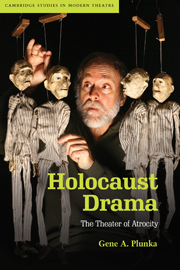Book contents
- Frontmatter
- Contents
- Acknowledgments
- 1 Introduction
- 2 Staging the Banality of Evil
- 3 Culture and the Holocaust
- 4 The Holocaust as Literature of the Body
- 5 Transcending the Holocaust
- 6 Marxism and the Holocaust
- 7 Aryan Responsibility During the Holocaust, I
- 8 Aryan Responsibility During the Holocaust, II
- 9 Heroism and Moral Responsibility in the Ghettoes
- 10 Dignity in the Concentration Camps
- 11 Holocaust Survivors in the United States and Israel
- 12 The Survivor Syndrome and the Effects of the Holocaust on Survivor Families
- 13 Holocaust Survivor Memory
- 14 The Holocaust and Collective Memory
- Notes
- Bibliography
- Index
4 - The Holocaust as Literature of the Body
Published online by Cambridge University Press: 01 July 2009
- Frontmatter
- Contents
- Acknowledgments
- 1 Introduction
- 2 Staging the Banality of Evil
- 3 Culture and the Holocaust
- 4 The Holocaust as Literature of the Body
- 5 Transcending the Holocaust
- 6 Marxism and the Holocaust
- 7 Aryan Responsibility During the Holocaust, I
- 8 Aryan Responsibility During the Holocaust, II
- 9 Heroism and Moral Responsibility in the Ghettoes
- 10 Dignity in the Concentration Camps
- 11 Holocaust Survivors in the United States and Israel
- 12 The Survivor Syndrome and the Effects of the Holocaust on Survivor Families
- 13 Holocaust Survivor Memory
- 14 The Holocaust and Collective Memory
- Notes
- Bibliography
- Index
Summary
Hitler left school in 1905 without completing his final examinations and thus without receiving a diploma. He was adept at freehand drawing but excelled only in gymnastics. Hitler's focus on the body rather than the intellect or the arts would become a key issue in the Nazi agenda. In his first major public address, on 13 August 1920 in Munich, Hitler extolled the virtues of economic reform and claimed that the Jews degraded and exploited labor. This was the first association of National Socialism with labor and the disassociation of Jews with hard work, which was to become one of the major tenets of Mein Kampf and later of the Nazi party. During the Weimar Republic, Jews were over-represented in trade, finance, commerce, the arts, and the sciences yet under-represented in agriculture and industry, the occupations associated with manual labor. The Jews were thus branded as shirking physical labor and incapable of doing honest work, nothing more than a liability to the prosperity of the state. During the latter stages of the Depression, Hitler stressed the need for manual labor, excluding the Jews as subalterns with regard to his future for Germany; the Jews were put in the same category as people with mental health problems, homosexuals, and those with physical disabilities, all of whom were seen as biologically crippling to the Reich.
- Type
- Chapter
- Information
- Holocaust DramaThe Theater of Atrocity, pp. 71 - 93Publisher: Cambridge University PressPrint publication year: 2009

